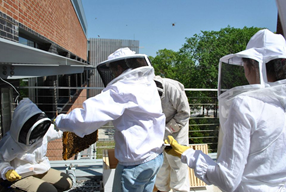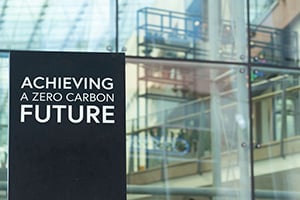By Ann Thompson
Consulting Analyst Intern
Sustainable Investment Group (SIG)
 Humans benefit from the work of pollinators on a daily basis. From honey to sweeten a cup of tea to onions used to flavor a dish, the work of bees, birds, butterflies, and other small mammals is essential to food chains and economic systems around the world. In the twenty-first century, the human population has developed a complicated relationship with our pollinating counterparts. As our need for food reliant on pollination has grown proportionally with our population, habitable space for these creatures has diminished. The Atlanta Zoo reports that of the 4,000 native bee species that inhabit North America, one in two are declining with one in four approaching extinction. These alarming numbers urge a question– how did we get here?
Humans benefit from the work of pollinators on a daily basis. From honey to sweeten a cup of tea to onions used to flavor a dish, the work of bees, birds, butterflies, and other small mammals is essential to food chains and economic systems around the world. In the twenty-first century, the human population has developed a complicated relationship with our pollinating counterparts. As our need for food reliant on pollination has grown proportionally with our population, habitable space for these creatures has diminished. The Atlanta Zoo reports that of the 4,000 native bee species that inhabit North America, one in two are declining with one in four approaching extinction. These alarming numbers urge a question– how did we get here?
The current state of pollinator health has largely been attributed to various manifestations of habitat loss.
- Urbanization is changing green, impermeable surfaces to concrete and metal.
- Global temperature increases are altering the bloom times of native flowering plants.
- Commercial agriculture is introducing pesticides that adversely affect pollinators.
These shifts in viable habitats have been accompanied by the threat of parasites and disease– most notably Colony Collapse Disorder, a phenomenon where entire honey bee hives seemingly disappear.
 Is there hope in restoring the health of pollinating species? Researchers at the Georgia Institute of Technology in Atlanta, Georgia believe so. The Urban Honey Bee Project, an interdisciplinary undergraduate research program, is seeking to better understand how urbanization impacts honey bees. The program brings together students from a wide range of backgrounds to discuss solutions to the issues threatening honey bees today.
Is there hope in restoring the health of pollinating species? Researchers at the Georgia Institute of Technology in Atlanta, Georgia believe so. The Urban Honey Bee Project, an interdisciplinary undergraduate research program, is seeking to better understand how urbanization impacts honey bees. The program brings together students from a wide range of backgrounds to discuss solutions to the issues threatening honey bees today.
The project has had many creative expressions since its founding in 2013.
- Students monitor hives placed on the roof of a prominent campus building, helping to analyze the effectiveness of incorporating green space and sustainable food systems into urban architecture.
- Through an affiliated class, computer scientists work to develop an app aimed at educating the public and track bee sightings in the metro Atlanta area.
- A team of engineers and biologists use Geographical Information Systems to map the locations of trees that bees pollinate and gain a better understanding of what areas of Atlanta would provide the best chance of survival for a new hive.
The central thread connecting all professors, students, supporters, and community members affiliated with Georgia Tech’s Urban Honeybee Project is the idea that pollinator health is a critical issue facing this generation and that interdisciplinary space open to anyone passionate about environmental sustainability is where innovative solutions will be found.
 Sustainable Investment Group (SIG) finds common ground with the Urban Honeybee Project in their vision for a more sustainable urban environment. Apart from SIG’s mission to lessen the impact of the built environment on the Earth, Senior Sustainability Consultant Jenn Mahon has taken up beekeeping in her home of Minnesota. Jenn’s interest in beekeeping began in an informative weekend class and has led her to three years of learning all about bees and even enjoying the best beekeeper benefit, honey! Jenn describes the last few years as a constant learning experience and fun challenge.
Sustainable Investment Group (SIG) finds common ground with the Urban Honeybee Project in their vision for a more sustainable urban environment. Apart from SIG’s mission to lessen the impact of the built environment on the Earth, Senior Sustainability Consultant Jenn Mahon has taken up beekeeping in her home of Minnesota. Jenn’s interest in beekeeping began in an informative weekend class and has led her to three years of learning all about bees and even enjoying the best beekeeper benefit, honey! Jenn describes the last few years as a constant learning experience and fun challenge.
If you are interested in how your home or office can be more sustainable and play a more positive role in addressing environmental issues like pollinator health, please visit our website and reach out. Sustainable Investment Group (SIG) provides Leadership in Energy & Environmental Design (LEED) consulting, LEED Exam Prep Training, Green Building Consulting and Technical services from our offices in Atlanta, GA; Boulder, CO; Minneapolis, MN; New York, NY and San Francisco, CA.
© 2019 Sustainable Investment Group (SIG). All rights reserved.



